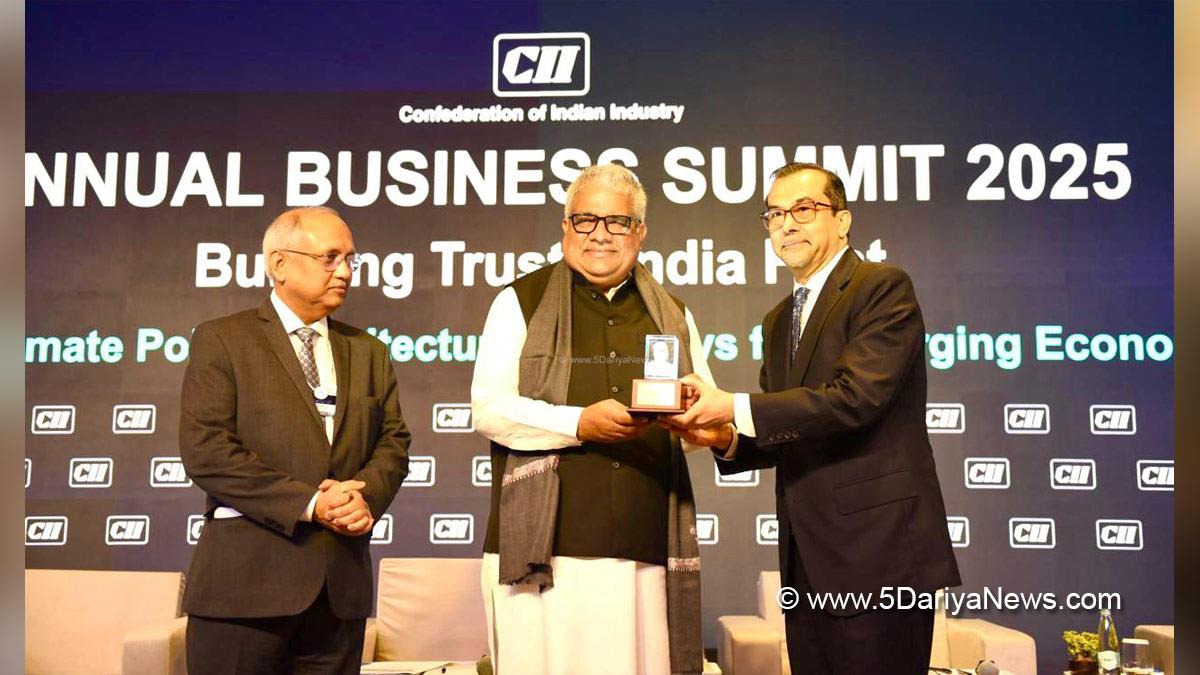Bhupender Yadav at CII Summit

Union Minister for Environment, Forest and Climate Change, Shri Bhupender Yadav, today addressed the Confederation of Indian Industry (CII) Annual Business Summit 2025, on the theme ‘Building Trust – India First’.
The Special Plenary Session address was focused on ‘India’s Climate Policy Architecture: Pathways for Emerging Economies’. Describing the ‘India Story’, Shri Yadav portrayed it as a blend of tradition and transformation, where democracy walks alongside development, and compassion coexists with assertiveness.
He underscored that the essence of the India Story lies in always keeping India First. Addressing the summit, Union Minister Shri Yadav praised Prime Minister Shri Narendra Modi’s initiative, Mission LiFE (Lifestyle for Environment), which transforms environmental protection into a participative process.
He highlighted that Mission LiFE encourages communities, businesses, and individuals to collectively contribute to saving the planet.
Union Minister Shri Yadav outlined India’s climate policy architecture, focusing on three key drivers:
1. Self-Reliant Circular Economy: A Path to Sustainable Growth
India is transitioning from a linear to a circular economy model, aiming to reduce waste and enhance resource efficiency. The government has introduced Extended Producer Responsibility (EPR) guidelines for various sectors, including tyres, batteries, plastics, and e-waste, to promote recycling and sustainable consumption.
Between 2022 and 2024, the recycling sector attracted investments totaling ₹10,000 crore, reflecting industry commitment to sustainable practices. The circular economy sector is projected to be worth $2 trillion by 2050, creating approximately 10 million jobs.
2. Protecting Natural Ecosystems and Strengthening Resilience
Under the leadership of Prime Minister Shri Narendra Modi, India has launched Mission LiFE (Lifestyle for Environment) and nationwide campaign ‘Ek Ped Maa Ke Naam’, a community-driven initiative aimed at environmental conservation.
The introduction of Green Credit Rules under Mission LiFE incentivizes voluntary actions toward environmental conservation, fostering a culture of sustainability.
3. Promoting Adaptation: Building Climate Resilience
India recognizes the challenges posed by climate change and is committed to building resilience through adaptation strategies. The government has released the Draft Framework of the Climate Finance Taxonomy, outlining methodologies for classifying activities under adaptation and mitigation.
Moreover, the development of the first National Adaptation Plan, to be submitted to the United Nations Framework Convention on Climate Change (UNFCCC), focuses on enhancing adaptive capacity, strengthening knowledge systems, and reducing exposure to climate risks.
In a world characterized by geopolitical uncertainties, Shri Yadav emphasized that India remains the most trusted partner globally. This trust is attributed to India’s political stability, visionary leadership, cultural values, and unwavering commitment to a sustainable future.
Union Minister Shri Yadav urged industry leaders to actively participate in building a self-reliant circular economy. He invited them to join the Resource Efficiency and Circular Economy Industry Coalition, launched under India’s G20 Presidency, as a collaborative platform to facilitate knowledge-sharing and sustainable practices.

Comments are closed.